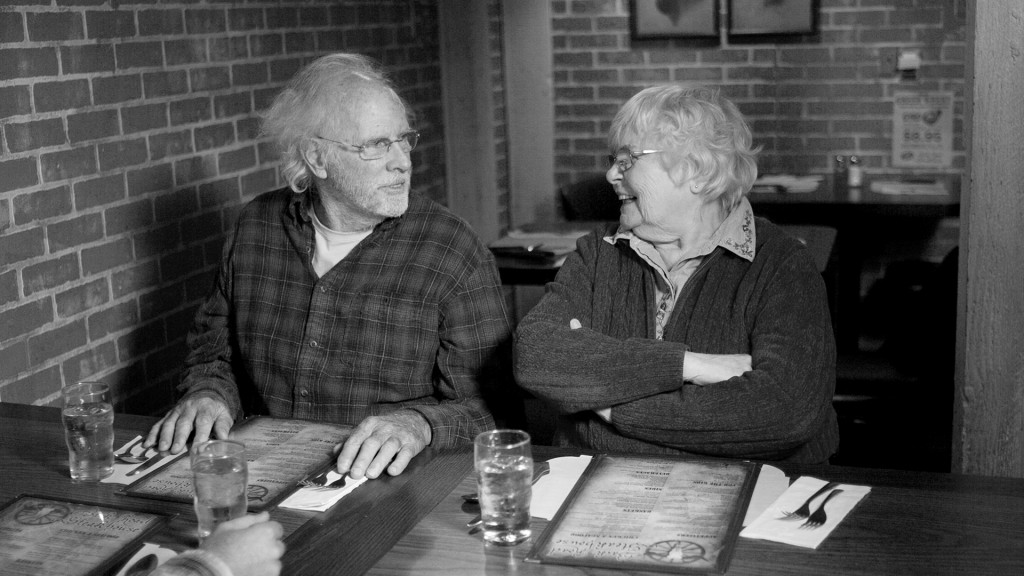Nebraska Review
 Filled with wry humour and pathos by the truck load Nebraska feels like something of a return to a familiar form and a higher standard for Alexander Payne, following his perfectly fine but rather underwhelming The Descendants.
Filled with wry humour and pathos by the truck load Nebraska feels like something of a return to a familiar form and a higher standard for Alexander Payne, following his perfectly fine but rather underwhelming The Descendants.
Nebraska begins with a shot of a solitary figure, which we later discover is Woody Grant (Bruce Dern), walking up a highway. Woody is alone, attempting to walk from his home in Billings, Montana to Lincoln, Nebraska to collect one million dollars that he believes he has won. The letter he has received regarding the winnings is a scam though, an attempt to con him into buying magazine subscriptions. It is never perhaps clear whether the elderly Woody genuinely believes that he has won, although he certainly seems to, but his attempts to go to Nebraska to collect his winnings certainly stand for more than simply a desire for the money.
Woody is getting old and his mental and physical state is going downhill rapidly. His nagging wife seems to think he’s a fool and he’s not exactly close with his two sons, played by Will Forte and Bob Odenkirk, both of home seem to think he’s just a bit of an old curmudgeon. And a drunk.
Finally despairing at his father’s attempts to walk to Nebraska, Dave (Forte) agrees to drive him there to ‘collect his winnings’, in the hope of finally excising the idea from Woody’s mind. En route Woody manages to get drunk, lose his teeth by a railway siding and then cut his head open badly. Deciding that it’s best if they take a day or two out somewhere nearby, before heading to Nebraska, Dave takes Woody back to his home town of Hawthorne.
Hawthorne offers an opportunity for Dave to better understand his father, like suddenly being able to reach inside Woody’s mind and pull out those experiences that helped shape Woody and to better appreciate the kind of man he really is. All this father/son reunion plotting may sound a little familiar and even a little twee, and to some degree it may well be, but there is enough wit and inventiveness in Bob Nelson’s screenplay and Payne’s direction to ensure that this isn’t a simple heartwarming tale of redemption and a family coming together.
The sheer unlikeability of many of the characters at times is a delicate game being played but this is one of the ways in which Nelson and Payne manage to wave a more complex and interesting narrative. Further tightropes are walked in the film’s depiction of middle America, with a lot of humour in the film made of two dumb cousins whose outlook on the world is even smaller than the town in which they inhabit. Nelson and Payne are careful though to be as tender to their characters as they are cutting and ultimately one is left more warmed by many of the characters than laughing at them. One notable example of this is Woody’s wife Kate (June Squibb) – Squibb also played the wife in Payne’s About Schmidt in 2002 – who is very hard to sympathise with at first but later revealed to be rather sweet and incredibly funny, all without losing the bite and sourness that first makes her stand out.
Dern as Woody is exceptional, although his character is referred to multiple times as a man of few words so isn’t exactly called upon to deliver Shakespearian soliloquies. Forte is something of weak link at times but playing the straight man in many of the more humorous scenes he equips himself adequately.
Payne directs the film in a relatively uncluttered manner, ensuring the film plays out as a slowly unravelling elegant narrative, but a rather too insistent score does occasionally get under ones skin and Phedon Papamichael’s black and white cinematography is so unremarkable that it borders on flat at times. The characters and the writing still shine through though and the subtle approach and smart writing make for a rich experience.